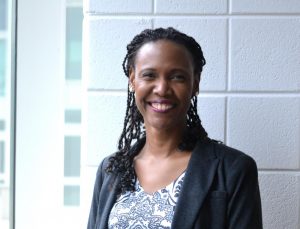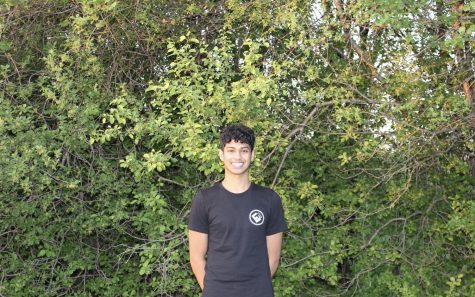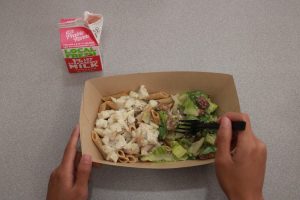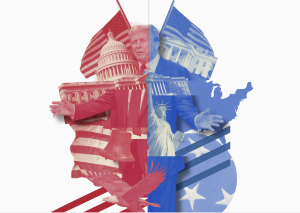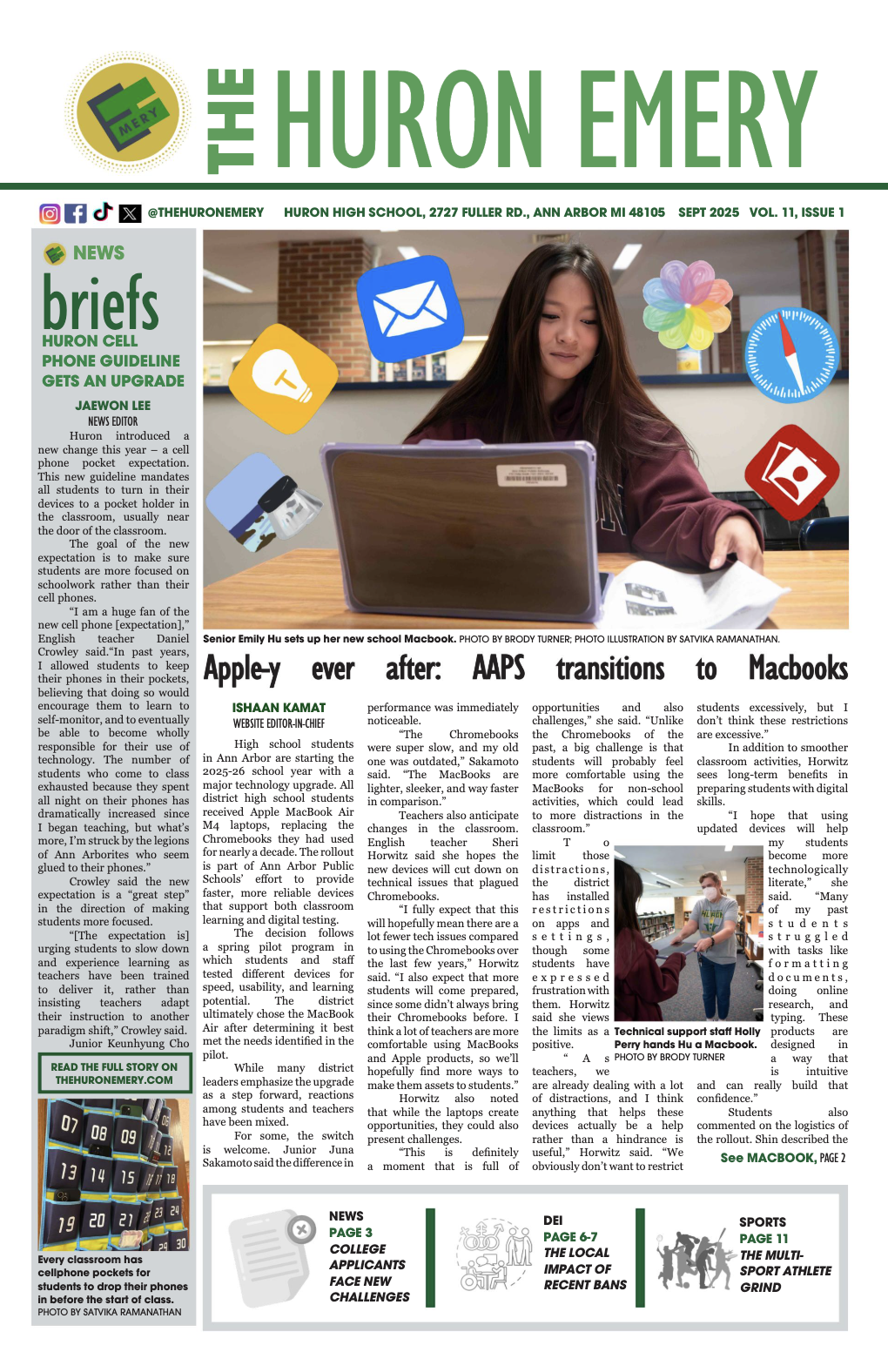Bipartisan brothers: The Harrisons reflect on their relationship in divisive times
Courtesy of Will and Jack Harrison. Photo edited by Vish Gondesi.
Both Will (right) and Jack Harrison (left) started forming their political identities around eighth grade. Their differing political views have caused many arguments. Regardless, the two still maintain a healthy relationship today.
January 31, 2021
Polarized politics. The us versus them mentality. Even with the current political landscape, senior Will Harrison and his brother, a Michigan State University student, Jack Harrison, learned to cope with the stark party divisions in their own household.
That’s because Jack has been a conservative leader, and is currently serving on The Michigan Federation of College Republicans, while Will considers himself an unaffiliated Democrat. The two started forming their own political identities around the same age, when they both were in the eighth grade. Part of the reason their beliefs diverged is due to their parents having never forced them to inherit their own. Both of their parents are moderate democrats.
“I was in the eighth grade with my teacher, and he decided to do a civics unit,” Jack said. “And it wasn’t totally part of the prescribed curriculum, but he decided to do it and I had really no exposure to anything politically related. So I remember we did one of those political ideology tests. I took it in the Clague Middle School Media Lab. And I remember, after everyone’s results popped up, everyone got different shades of blue, some were more light blue, some were darker blue, except me. I had a moderately red result.”
On the other hand, Will was drawn to the 2016 election, and had interest in Senator Bernie Sanders.
“I think a substantial way in which I was kind of informed was through Late Night comedians, whether it be Jon Stewart or John Oliver, or any of the Late Night talk show hosts, because they introduced new and complex topics that I felt were well researched in a very comical way,” Will said. “So, that was one way I started getting involved in politics too, and from there just with school having to do projects. I think there’s also an element of wanting to separate myself from my family that motivated some of my inclinations to question the Republican Party.”
And he did question. As they both expanded their political knowledge, they eventually started debating over things like policy to other vital issues, creating a new element in their relationship.
“I love my brother, he’s a great guy,” Will said. “I think he’s just a really nice guy who’s honestly hard working, and I think we’re close. I appreciate him, and I ask him for advice. It’s been really nice having him home during the pandemic, to keep in contact. But it definitely has strained our relationship, both in terms of how the sibling rivalry is expressed through political debate, but also through the real ideas and real anger, perhaps with our differences in set of beliefs. There’s definitely real issues that color our relationship in a more negative way as it becomes combative. But overall, I think our family bonds are stronger than that. And that’s something we both really work hard to cultivate.”
It wasn’t uncommon for these debates to quickly become heated or tense. Sometimes they would have to learn to move on, when neither of them could get their point across. According to Will it also helped to have their parents, “yelling at them to be nice to each other.”
“It’s good, first of all, that our political opinions elicit emotional responses, but when it can lead to fighting, and interfere with relationships, that’s the problem,” Jack said. “But I am thankful that Will and I can have our disagreements, but still debate and offer opinions. I personally think I am a little bit better at keeping myself more calm, but I think that’s because he has a lot of passions, and he’s really into policies and in different aspects of government that he really feels needs changes. So, it’s good to see the emotion, it’s good to see the passion. That’s sort of what the relationship is, nothing [political] that really interferes with it. And I think it is healthy to have dialogue, too.”
In having these conversations, the brothers proactively tried to stay open-minded with one another, allowing them to share their beliefs freely.
“I also think it’s important to state that neither of us really hold back on our opinions when we have discussions, [I know] at least I don’t,” Will said. “Because that’s not what I think unity is, I think you need to respect the other person’s desire to have an ability to have beliefs.”
The nature of their relationship prompts them to look for common ground, in a political environment today which many struggle to do.
“Especially right now, especially after a transfer of power, we Americans need to really try and unify,” Jack said. “And it’s tough. I mean, I’m on social media for my job all the time, almost too much, probably and I just see all these different opinions.”
Although Jack is majoring in political science, and his experience as a Republican committee leader focuses on community outreach and policy regulations, he realizes that unifying on policy isn’t always part of the bigger picture.
“It seems very difficult to unite the country,” Jack said. “So that always needs to be the primary goal, and not in the sense that, ‘oh, my goodness, we need to unite behind policies’, because obviously, that’s not going to happen. Biden’s administration’s already reversed many of the executive orders that the Trump administration has, but I think the common ground is having respect and is having a conversation. What I tell people is it’s not just having a conversation, but it’s actually having that conversation to learn, to listen and to actually absorb what the other person is thinking. So at least with commonality in that sense, I think that’s where it needs to happen, and I think it needs to center around the fact that we are all in this country. That we are all Americans.”
For example, Will has had strong feelings against Trump, and thinks he’s “morally reprehensible” and “incompetent.” However, he doesn’t allow these feelings to cloud his thoughts regarding every Trump supporter.
“I think understanding that a lot of decisions were made by Trump voters, because they were in pain, and because they’re facing real life struggles,” Will said. “So that’s a way I’ve had to rationalize why Trump is a political phenomenon and why people have voted for him, because I don’t characterize every Trump voter or policy as racist. I think that’s too absolute. And inversely, my brother has worked hard to recognize that same issue.”
As a result, Jack and Will don’t see family issues stemming anything political. Granted, their connection as brothers might make it easier for them to see the perspective of the other side. However, this is also something those around them can observe and learn from.
“I think, [by] finding common ground in the issues that have negatively affected you, you can search for discussions and search for solutions together,” Will said. “I think the important thing is that you don’t have to agree on everything to have unity and to have relationships. Because there’s no such thing as an absolute solution to a problem and there’s no such thing as an absolute presentation of a problem. It’s far too complicated to be able to do that. Both parties have insights and both ideologies have insights into the complexities of those different things. So I think I think there’s an element of just humbling yourself to say that you don’t have all the answers and that your party doesn’t have all the answers.”





